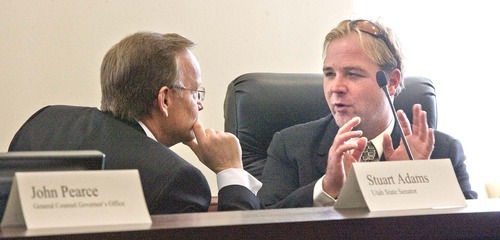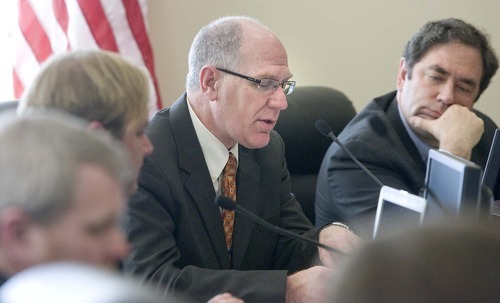This is an archived article that was published on sltrib.com in 2011, and information in the article may be outdated. It is provided only for personal research purposes and may not be reprinted.
A legislative working group tasked with reviewing Utah's open records law moved closer Wednesday to focusing on what revisions may be needed to balance access, privacy, transparency and government efficiency.
Lane Beattie, chairman of the GRAMA Working Group, said he'll set up subcommittees that will meet next week to look at specific topics raised so far, such as response times to voluminous requests, how costs should be allocated and whether the law does enough to protect privacy of governmental officials and their constituents. By the end of May, he expects the group will have concrete ideas to forward to lawmakers.
Given widely varying opinions among group members — and complexity of the issues related to Utah's Government Records Access and Management Act — that could be an ambitious deadline. The group is reviewing possible changes to the Act in the wake of HB477, a controversial law that made sweeping changes to the law before being repealed last month.
As in previous meetings, group discussion focused largely on lawmakers' concerns about their own privacy in public and personal realms.
John Fellows, the Legislature's general counsel, said some lawmakers are concerned GRAMA doesn't allow them to quietly vet bill ideas before deciding whether to proceed with a proposal. He offered the example of what became known as the "Bambi barbecue bill" floated by a legislator two decades ago, which would have allowed a driver who hit and killed a deer to harvest it. The bill fizzled.
"I don't think the purpose of GRAMA is to save legislators from embarrassment," said Paul Edwards, an opinion writer for the Deseret News. "When you say you want to serve as a public servant in this state, you've got to have a little bit of thick skin. A lot of good ideas come with plenty of criticism."
Sen. Pat Jones, D-Salt Lake, said she understands the public's interest in being part of the legislative process before a bill is set in cement. "I don't mind people knowing what my ideas are," she said.
But another lawmaker had a very different reaction.
"I think I have the rights to my personal thoughts and personal deliberations," said Sen. Stuart Adams, R-Layton, who has argued that reviews of his records are a Fourth Amendment violation.
Fellows also offered a hypothetical example of where the line between public and private records might blur: Would a grocery list that included picking up a birth control device be a public record because it belonged to a lawmaker who opposed birth control legislation? One media member argued it would be, he said.
Fellows warned the working group that a move toward too much openness could have a "chilling effect" and drive the deliberative process "underground." He said that's what happened a few years ago when media "kicked up a fuss" about access to the Senate Rules Committee's closed meetings. The meetings were opened, and a lot of decisions about bills are now "made elsewhere."
"If you make it too open, the real decisions will be hidden," he said.
But several working group members said too much attention is being focused on lawmakers' concerns, rather than on protecting constituents or addressing concerns of cities, counties and other government entities.
Rep. Holly Richardson, R-Highland, offered what happened when one media outlet (The Salt Lake Tribune) requested emails sent to the governor about a list of undocumented residents who received state services; constituent's names weren't redacted and were used in the resulting news story, she said.
"What protections can we put in that allow free flow of government, but doesn't restrict constituents' interest in contacting legislators? " asked Richardson.
David Kirkham, founder of the Utah Tea Party, when members of his group were asked, most said they thought their conversations with lawmakers were private.
Some working group members continue to suggest that technology exists to help public officials classify their records as public, private and protected; software also can be used do term-specific searches that lessen the need for staff to look at individual records.
But those fixes cost money, which other group members said is an obstacle for most governmental entities, who are struggling not just with records access issues but managing the mountains of data being created today.
Ogden City, for example, gets 1 million emails a month, said Mark Johnson, who works in the city's Management Services Department. At the same time, it is receiving an increasing number of broad GRAMAs from "novice" requesters who aren't sure what they are after.
"That is a frustration to a city or county that has limited resources," he said.
Twitter: @Brooke4Trib —
No public comment allowed
The GRAMA Working Group meeting ended Wednesday in frustration for a handful of public advocates who were unhappy that there was no public comment period, as chairman Lane Beattie pledged to allow two weeks ago.
"I'm very annoyed," said Jeff Salt of the Jordan River Restoration Network. "He pre-empted us from participating in the meeting today."
Added long-time activist Claire Geddes: "We've spent three hours listening to them pontificate about privacy — mostly their privacy. . . . This is the problem we have with the Legislature. Same old thing."
The working group's next public meeting is April 27.





